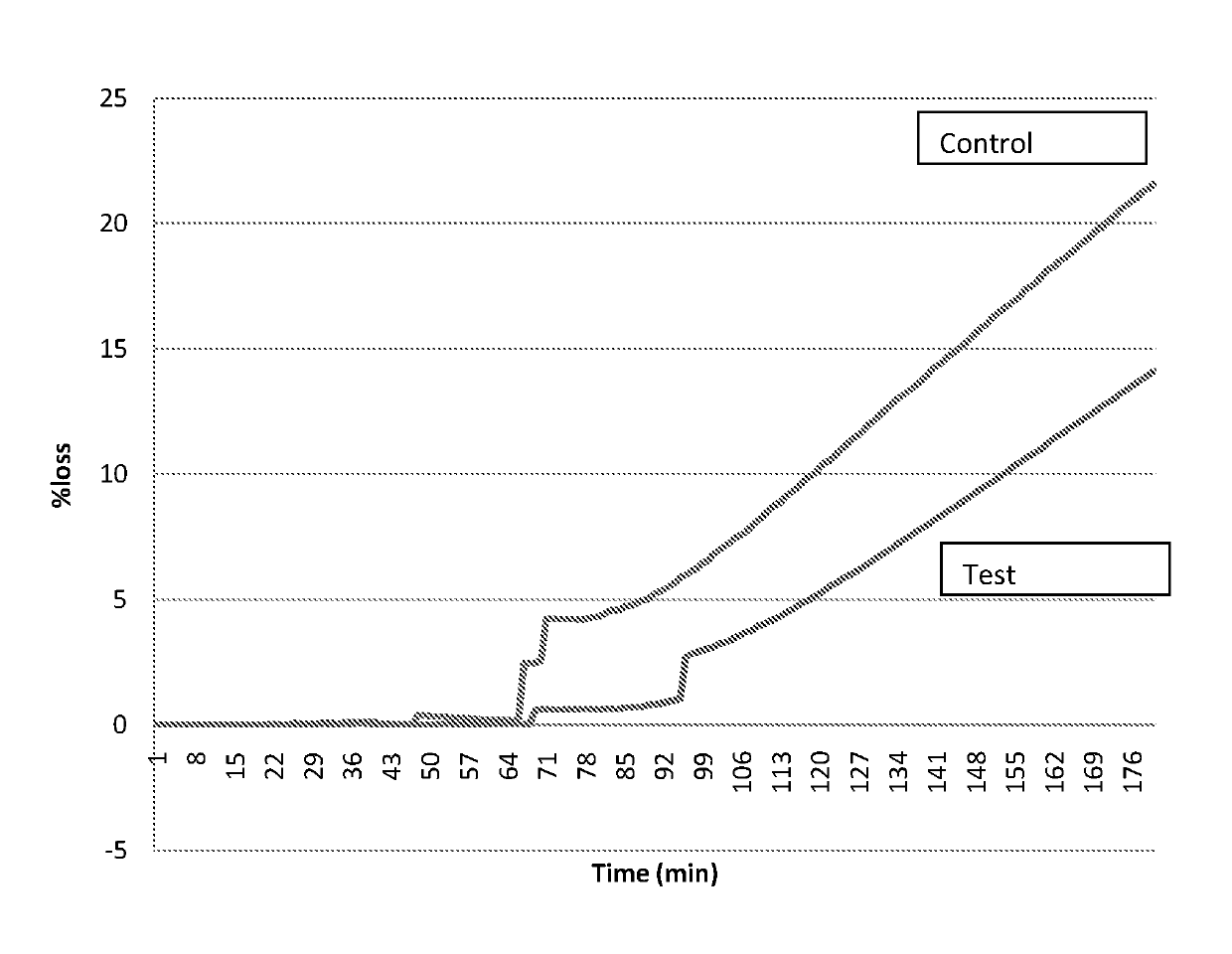Shelf-stable confectionery products
a shelf-stable, confectionery technology, applied in the direction of transportation and packaging, packaging, biochemistry apparatus and processes, etc., can solve the problems of no sophisticated ice cream products, no environmental protection, expensive and non-environmental-friendly process for producing and distributing ice cream, etc., to achieve the effect of improving the melting behaviour
- Summary
- Abstract
- Description
- Claims
- Application Information
AI Technical Summary
Benefits of technology
Problems solved by technology
Method used
Image
Examples
example 1
Ready-to-Freeze Aerated Dessert, Heat Treated Before Packaging
[0116]
TABLE 1IngredientWt % offinal productFat10Sugar12.5Glucose syrup 40 DE4.5MSNF7.5Whey Solids2.5Guar0.15CMC0.05Carrageenan0.02PGMS0.3Unsaturated0.05monoglyceridesWater62.4Total Solids35Total proteins2.5
[0117]Conventional mix-making procedures were followed.
[0118]In a first variable, referred to as “Control 1”, the pH of the mix was 6.8 at 25° C. before heat treatment. No other acidulants were added to the mix. In a second variable “test 1”, citric acid was used to lower the pH to 6.2 before sterilization.
[0119]Both variables were then processed the same way:[0120]homogenisation (160 bar)[0121]Heat treatment 95° C. to 135° C. for 10 to 90 seconds[0122]Cooling to 4° C.[0123]Aging for 24 hours at 4° C.[0124]Foaming (MiniMondomix) to provide 100% overrun
[0125]Then the sterile mixes were aseptically packed in tubs of 200 ml and stored at 20° C.
[0126]After 7 hours, the product according to the invention did not present drai...
example 2
Frozen Confections Prepared by Quiescent Freezing
[0127]The control and test foams of example 1 were quiescently frozen at −18° C.
[0128]The melting behaviour of both frozen foams was analysed following drip test methodology. This methodology consists in installing the frozen confection into a grid at constant temperature of 20° C. and humidity. The weight of the material that drips between the grids is recorded every minute during 120 minutes. The losses of material when the frozen confection melts are expressed as percentage with respect to the initial weight.
[0129]The results are reported in FIG. 1 and show that the frozen foam according to the invention has more resistance to melting once quiescently frozen than the control.
example 3
Frozen Dairy Dessert Containing 11% Fat, Sterilized into the Packaging
[0130]
TABLE 1IngredientWt % of final productFat11Sugar19-20MSNF10.9Natural 0.1-0.35emulsifier
[0131]In this variable, referred to as “Control 2”, conventional mix-making procedures were followed to yield to a 11.0% fat and 10.9% MSNF mix. The measured pH of the mix was 6.6 before sterilization. No other acidulants were added to the mix. The mix was packed and then heat treated by a retort method process at 121° C. for 40 to 60 min. In a second variable a similar mix with 11.0% by weight fat and 10.9% MSNF was tested following a controlled reduction in pH. A citric acid solution was used to lower the pH value to 6.2 before heat treatment the mix was then process, at 121° C. for 40 to 60 min. The two variables were stored at 20° C. during several months; afterwards they were frozen on a static freezer during 6 hours at −20° C.
[0132]The product made with controlled reduction in pH was significantly smoother, creamer a...
PUM
 Login to View More
Login to View More Abstract
Description
Claims
Application Information
 Login to View More
Login to View More - R&D
- Intellectual Property
- Life Sciences
- Materials
- Tech Scout
- Unparalleled Data Quality
- Higher Quality Content
- 60% Fewer Hallucinations
Browse by: Latest US Patents, China's latest patents, Technical Efficacy Thesaurus, Application Domain, Technology Topic, Popular Technical Reports.
© 2025 PatSnap. All rights reserved.Legal|Privacy policy|Modern Slavery Act Transparency Statement|Sitemap|About US| Contact US: help@patsnap.com

